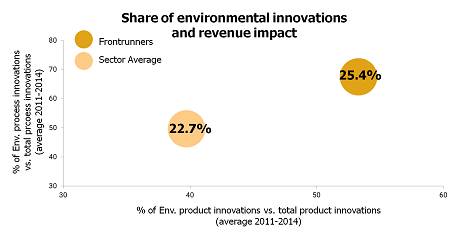Finch & Beak is now SLR Consulting, a global organization that supports its clients on setting sustainability strategies and seeing them through to implementation.
We invite you to check out the SLR website, so you can see the full potential of what we offer, from sustainability strategies to implementation covering Climate Resilience & Net Zero, Natural Capital & Biodiversity, Social & Community Impact, Responsible Sourcing and more.
In our 2016 sector research, F&B found that, based on 4 years of Dow Jones Sustainability Index data, frontrunners in the chemical sector have a far higher share of environmental innovations for both processes and products. Even more tellingly, these frontrunners generate an almost 12% higher revenue share with those innovations (25.4% vs. 22.7%).

With 2016 sales of €11.9 billion, Covestro is among the world’s largest polymer companies. Business activities are focused on the manufacture of high-tech polymer materials and the development of innovative solutions for products used in many areas of daily life. Research between Covestro (formerly Bayer MaterialScience) and the CAT Catalytic Center at RWTH Aachen University resulted in using C02 as a building block for polyurethane foam feedstocks. Covestro commissioned its 5,000 tonnes-a-year demonstration plant in Dormagen, which uses 20% C02 in its feedstock mix, in June 2016. The C02 used is a waste product from a neighbouring chemical company.
AkzoNobel’s Waste2Chemicals program objective is to realize a circular cycle in which waste, residual bio-mass and other feedstock, is collected and then used as resource to produce methanol, which is then used as a raw material to produce high-value chemicals.
The realization of Waste2Chemicals was something that AkzoNobel could not have done in isolation. Ultimately, AkzoNobel attracted 14 partners such as leading waste-to-product company Van Gansewinkel (now Renewi) and Air Liquide to join the initiative. As all 14 companies are spread out in the value chain, all actors in the initiative can contribute to reducing the overall environmental footprint by focusing on their individual strengths. At current the construction of the first Waste2Chemicals factory in Rotterdam is under investigation.

For the rest of the sector the question remains, how to drive innovation based upon a circular economy model. What to do to capture the hidden value? A low cost –high yield approach is to drive a 7-week process within the organisation; the Circular Economy Sprint. Adapting backlog and sprint techniques from the widely spread Scrum-methodology, the Circular Economy Sprint has several benefits:
Are you interested in accelerating your sustainability program with the Circular Economy Sprint and ready to capture the value, contact us at hello@finchandbeak.com for more information.
Finch & Beak
hello@finchandbeak.com
+34 627 788 170